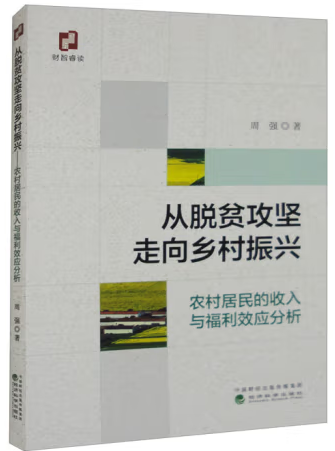The monograph of IIDPF researcher Zhou Qiang, From Poverty Eradication to Rural Revitalisation: An Analysis of the Income and Welfare Effects on Rural Residents has been published by the Economic Science Press. The book is the result of the completion of the general project of the National Social Science Foundation (18BJL125), and it is also funded by the Special Project of Basic Research Fund of ZUEL (2722022EY015).
Abstract
China has moved from poverty eradication to rural revitalisation. Poverty eradication and rural revitalisation are important strategies formulated by the Party Central Committee to achieve the two centennial goals. Since the 18th CPC National Congress, the CPC Central Committee has made poverty eradication and improvement of people's livelihoods one of the basic goals of rural reform and development in 2020, and has made poverty eradication a bottom-line task and a landmark indicator for building a moderately prosperous society in all aspects. At the same time, the report of the 19th CPC National Congress put forward the implementation of the strategy of rural revitalisation and the development goal of modernising agriculture and rural areas, and clearly set out the rural development goal and construction requirements of "prosperous industries, ecological livability, civilised rural customs, effective governance and a rich life", to ensure that a beautiful countryside with strong agriculture, a beautiful countryside and rich peasants will be realised in 2050, and that the common wealth of all residents will be realised. The countryside will become a beautiful countryside with strong agriculture, beautiful countryside and rich peasants by 2050, and common prosperity will be realised for all residents. In the process of moving towards common prosperity, rural revitalisation is an upgraded version of poverty eradication, aiming to promote comprehensive rural development on the basis of eliminating absolute poverty. Practices in the areas of industry, ecology, education, healthcare, employment and grassroots governance during the poverty eradication campaign have provided basic guarantees and valuable experience for "industrial revitalisation, ecological revitalisation, cultural revitalisation, talent revitalisation and organisational revitalisation" in rural development. Therefore, under the guidance of rural revitalisation and common prosperity, it is of great theoretical and practical significance to explore the sustainable development ability of rural people who have been lifted out of poverty, and to analyse the impact of precise poverty alleviation policies on the income and welfare of rural residents during the period of poverty alleviation. Reflections on the above issues have formed the initial intention and goal of this study, as well as the starting point and direction of the book's layout. The book develops from five aspects: (1) It answers the question of whether the precise poverty alleviation policy in the period of poverty eradication has fostered the long-term endogenous development motivation of the poverty-eradicating population? And, it analyses in-depth the income-generating, redistributive and welfare effects of the policy. (2) Analysed whether the benefits of poverty alleviation have benefited the lowest-income group more substantially? It explains the distributional flow of the benefits of the precise poverty alleviation policy and its mechanism of action. (3) Comparing and analysing the different effects on the poor population between the "blood transfusion" and "blood-creation" poverty alleviation modes, so as to find out the optimal governance mechanism for alleviating relative poverty in the stage of rural revitalisation. (4) We analyse whether cash subsidies for the poor have created a "welfare dependency" effect, and respond to the current controversy in academia. (5) Quantitatively analysed the effect of the policy on poverty alleviation, explored the effects of the policy on poverty alleviation in terms of spirit and intelligence, and further examined the intergenerational transmission effect of the policy on poverty alleviation. In the theoretical part of the book, combining with the latest development of the current poverty theory research, based on the perspective of "feasible ability", firstly, it puts forward the analysis method of "human sustainable development" curve model, analyses the development dilemma and characteristics of the rural poor and non-poor (low-income) populations, and provides the basis for the rural revitalization of the countryside. First, the "human sustainable development" curve model analysis method is proposed, which analyses the development dilemmas and characteristics of the rural poor and non-poor (low-income) population, and lays a theoretical foundation for research on empowering low-income people's sustainable development ability in the period of rural revitalization; second, the "duration analysis method" is proposed for identifying and measuring the poor population, which integrates the static incidence measurement of poverty with the dynamic transformation of the poverty state, and expands the analysis of the poverty problem into the dynamic field. It lays a methodological foundation for promoting the integration of poverty theory research and rural revitalisation practice. In the empirical part, it mainly focuses on exploring the differentiation between "blood transfusion" poverty alleviation and "blood-creation" poverty alleviation in the period of poverty alleviation, and analyses the precise poverty alleviation policy's impact on poverty alleviation with the help of the measurement methods or models such as breakpoint regression, double-difference scores, propensity score matching, and so on. With the help of measurement methods or models such as double-difference regression and propensity score matching in the policy effect assessment method, the book analyses the income-generating, redistributive and welfare effects of the precise poverty alleviation policy on the poor population, and discusses the redistributive effects of rural medical reform and the "income-generating and empowering" effects of asset accumulation. At the same time, based on the perspective of "feasible ability", the book analyses in depth the spiritual and cultural poverty faced by rural residents in addition to material poverty, and effectively quantifies the problems of "helping the will" and "helping the intellect". It also effectively quantifies the issues of "helping the will" and "helping the intellect", and thoroughly researches the important issues of "helping both the will and the intellect" and its intergenerational transmission effect on the poor population in the fight against poverty, thus enriching the research results on the material and spiritual prosperity in the common prosperity in the rural areas.

Brief Bio

Zhou Qiang, a CCP member, is an Associate Professor at the School of Economics of Zhongnan University of Economics and Law, as well as the head of the Digital Economy Department and a supervisor for master's students. He is a researcher in the Income Distribution and Modern Finance Scientific Innovation and Talent Introduction Platform (IIDPF), a postdoctoral fellow at the School of Labor and Human Resources at Renmin University of China, and holds a Ph.D. in Economics from Wuhan University. His research primarily focuses on developmental economics, shared prosperity and income distribution, digital economy, and employment. In recent years, he has led one National Social Science Fund project, participated in two major national social science projects, and several university-level projects. He has published three monographs, contributed to two others, and his doctoral thesis was nominated for the "2018 Outstanding Doctoral Dissertation in Economics in China" award (Wuhan University). His series of research outcomes have earned five provincial and ministerial level awards, including the "8th Higher Education Outstanding Scientific Research Output Awards (Humanities and Social Sciences) Second Prize" (2020), the "8th Zhang Peigang Development Economics Outstanding Achievement Award" (2020), and the "12th Hubei Province Social Science Outstanding Achievement Second Prize" (2020). He has published more than 20 papers in journals like "Economic Research," "Statistical Research" (2 papers), "Quantitative & Technical Economics" (3 papers), "Chinese Journal of Population Science," "China Rural Economy," and "China Soft Science," many of which have been reprinted by the Reproduction Center of Renmin University of China. He is currently an anonymous peer reviewer for journals such as "Economic Research," "Quantitative & Technical Economics," "China Rural Economy," and "Economic Review."
